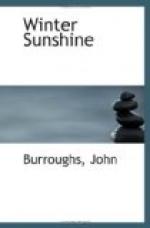One more item from the books. From the fact that in the bone caves in this country skulls of the gray fox are found, but none of the red, it is inferred by some naturalists that the red fox is a descendant from the European species, which it resembles in form but surpasses in beauty, and its appearance on this continent is of comparatively recent date.
V. A MARCH CHRONICLE
ON THE POTOMAC
March 1.—The first day of spring and the first spring day! I felt the change the moment I put my head out of doors in the morning. A fitful, gusty south wind was blowing, though the sky was clear. But the sunlight was not the same. There was an interfusion of a new element. Not ten days before there had been a day just as bright,—even brighter and warmer,—a clear, crystalline day of February, with nothing vernal in it; but this day was opaline; there was a film, a sentiment in it, a nearer approach to life. Then there was that fresh, indescribable odor, a breath from the Gulf, or from Florida and the Carolinas,—a subtle, persuasive influence that thrilled the sense. Every root and rootlet under ground must have felt it; the buds of the soft maple and silver poplar felt it, and swelled perceptibly during the day. The robins knew it, and were here that morning; so were the crow blackbirds. The shad must have known it, down deep in their marine retreats, and leaped and sported about the mouths of the rivers, ready to dart up them if the genial influence continued. The bees in the hive also, or in the old tree in the woods, no doubt awoke to new life; and the hibernating animals, the bears and woodchucks, rolled up in their subterranean dens,—I imagine the warmth reached even them, and quickened their sluggish circulation.
Then in the afternoon there was the smell of smoke,—the first spring fires in the open air. The Virginia farmer is raking together the rubbish in his garden, or in the field he is preparing for the plow, and burning it up. In imagination I am there to help him. I see the children playing about, delighted with the sport and the resumption of work; the smoke goes up through the shining haze; the farmhouse door stands open, and lets in the afternoon sun; the cow lows for her calf, or hides it in the woods; and in the morning the geese, sporting in the spring-sun, answer the call of the wild flock steering northward above them.
As I stroll through the market I see the signs here. That old colored woman has brought spring in her basket in those great green flakes of moss, with arbutus showing the pink; and her old man is just in good time with his fruit trees and gooseberry bushes. Various bulbs and roots are also being brought out and offered, and the onions are sprouting on the stands. I see bunches of robins and cedar-birds also,—so much melody and beauty cut off from the supply going north. The fish-market is beginning to be bright with perch and bass, and with shad from the Southern rivers, and wild ducks are taking the place of prairie hens and quails.




